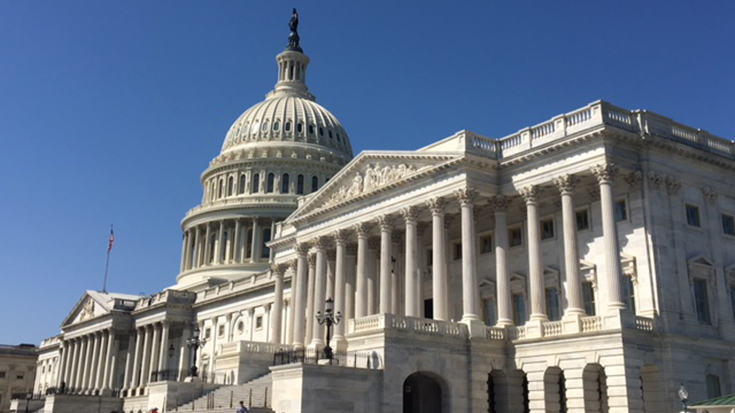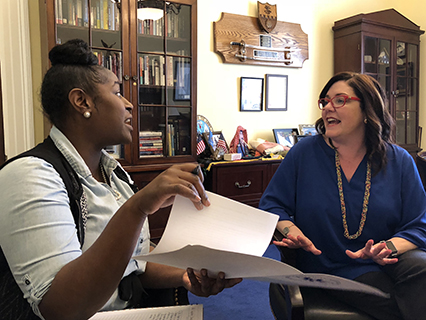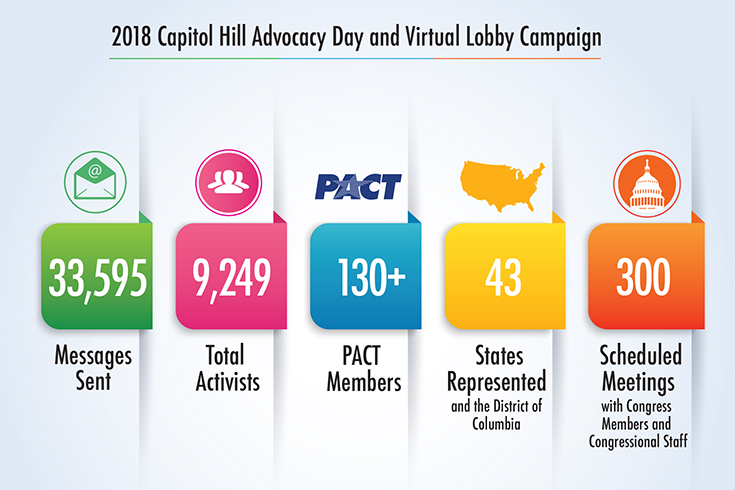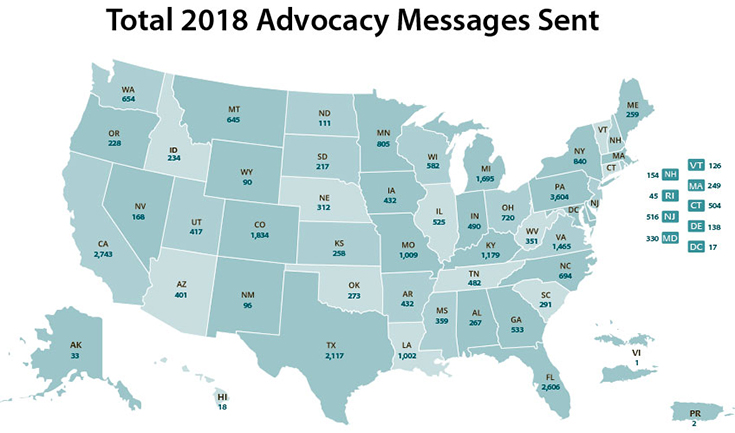

More than 130 respiratory therapists, appointed as Political Advocacy Contact Team members by their states, headed to Washington, D.C. on May 1 to lobby their Congressional delegations seeking support for a Telehealth Pilot focusing solely on respiratory therapists.
“This year’s Advocacy Day on the Hill was one of the best,” said AARC Associate Executive Director for Advocacy and Government Affairs Anne Marie Hummel. “Even though Congress Members were on recess, it turned out to be an advantage because key health and legislative staff had more time to spend and were more engaged and attentive.”

A rewarding trip
Lisa Fuchs, MHA, RRT, CTTS, from Nebraska, found Hill Day to be very rewarding as an advocate for the profession.
“This past Hill Day was my third consecutive time to represent Nebraska in advocating for Telehealth Medicine,” Fuchs said. “To me, it’s easy if you’re passionate about your profession, the patients, and in ethically promoting something that can be the best care for the patient, and for the healthcare organization.”
According to Fuchs, three of the five Congress representatives she visited with had already done some research on respiratory care because of past Hill Day visits with Fuchs. As a result, they fully support the Telehealth Parity ACT, as well as the pilot.
“I came back to Nebraska feeling a sense of achievement on my short trip to Washington, D.C.,” Fuchs said.
Jennifer Blevin, RRT, RRT-ACCS, of Oklahoma, had the chance to meet with Alaura Ervin from Congressman Steve Russell’s office. They discussed the importance and need for RTs.
“This was my first time going to the hill with the AARC,” said Blevin. “I left the hill with a renewed passion for my profession and the need to move it into the spotlight. RTs are an extremely important part of health care and adding them to telehealth care is just common sense when it comes to patients with chronic pulmonary diseases.”
Making an impact
For Robert L. Shoemaker, a respiratory therapy student from New York, pushing the profession forward was his main goal for participating in Hill Day.
“I figured the best way to get involved and learn how to correctly push this wonderful profession forward was to join in the trip to Hill Day,” Shoemaker said. “Being a student, I was also motivated to go in order to see, learn, and ask questions to some of the top people in our profession.”
Shoemaker also enjoys politics and appreciated this behind-the-scenes experience.
“I loved it!” Shoemaker said.
The biggest takeaway from the trip for Shoemaker was witnessing how getting involved does make a difference. He believes that people who take the time to reach out to their representatives and senators and ask for their support help impact the growth of the respiratory care profession.
A positive experience
Having now attended two consecutive AARC Hill Days, Robert Aranson, BS, MD, FCCM, feels the experiences have always been positive. He is also the first chair of the AARC Board of Medical Advisors to attend Hill Day.
Dr. Aranson has been a pulmonologist and intensivist for 35 years; however, he started his medical career as an OJT RT in Maine during college and medical school.
“So I remember my roots, and how important respiratory therapy is to my medical subspecialties,” Dr. Aranson said. “RTs are often my right hand in taking care of my patients. So I feel obligated to help RTs in their mission, because the more success they achieve, the more success I will achieve in caring for my patients.”
Advocating for patients
Linda Nelson, BS, RRT, feels that coming to Washington, D.C. to advocate for respiratory patients in Nebraska is always a great experience.
“Not only because of the relationships that you form with advocates from across the nation but also because our representatives and their staff members are very welcoming and inviting,” Nelson said. According to Nelson, rural Nebraska has its own set of challenges in healthcare, with one being respiratory care and access to specialists. This lacking in providers and services is what motivates Nelson to advocate on behalf of respiratory patients and therapists.
“It is essential in our area to work as a team and the COPD pilot program and telehealth initiatives allow our facility to accomplish a goal to deliver comprehensive care at home in our local community,” Nelson said.
Gaining support
Frank R. Salvatore Jr., MBA, RRT, FAARC, has taken part in Hill Day for many years, meeting with dozens of office members. He continues to be amazed that these offices know of respiratory therapy and its role in patient advocacy.
“Between the fact that many of these offices remember our previous visits or the fact that they were receiving many e-mails from back home, they knew we were in town and why we were there,” Salvatore said. “The wheels of legislation grind woefully slow in Washington D.C., but we left there with a feeling that our meetings made an impact and we’re hopeful that there will be a bill for our proposed Telehealth Pilot.”
“Overall, there was a lot of support for our initiative and many asked for follow-up once we have a bill introduced,” Hummel said.

Always an advocate
Whether directly or indirectly, a Telehealth Pilot impacts patients and should be advocated fully.
“There is still going to be opportunities to write e-mails, make calls and even visit with the Representatives and Senators when they’re back in the district campaigning,” Salvatore said. “I encourage RTs to get to know what we’re advocating for and take any opportunity to get out there and advocate.”
